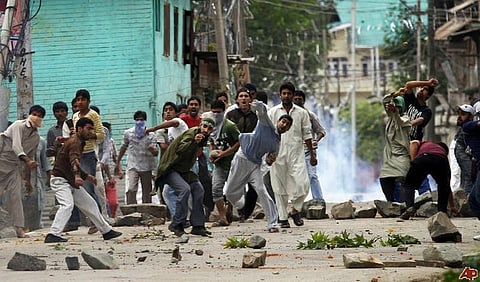State against society
I visited Srinagar – the summer capital of India-occupied Kashmir in January 2016. As a student of history, I went fully conscious of the vexed incorporation of the territory of this erstwhile princely state into India in October 1947 in the name of "national unity and integrity". Consequently, I had few illusions about the ever-widening gap between the ideals of India's democracy and their practical manifestation in its relationship with Kashmir since. Put simply, this relationship reduces Kashmir to one among many, what anthropologist Kamala Visweswaran calls, "geographies of everyday occupation" of social and individual life by the state apparatus. Yet, I was taken aback by the latter's overt omnipresence, ostensibly, during "peace" time. Given this oppressive military and para-military penetration of the landscape, especially in the last 25 years, it is no wonder that the civilian uprisings of 1990, 2008 and 2010 and now, in 2016, represent a cyclic pattern of violence, which will continue unabated, until and unless the Indian State genuinely engages with the Kashmiri people and their aspirations.
I was not to know then that six months later, yet another round of protests and a brutal military response would begin; one with an immediate trigger (the death of the charismatic militant leader Burhan Muzaffar Wani), but well-located in the longue duree of structural "domination" over individual "resistance". Back in January, as I came out of the Srinagar International Airport and reached the exit gate, two sights competed for my attention: a row of shops on the left in a small semi-circle, populated by men in pherans, and a cluster of personnel from the Indian armed forces in combat fatigues. Their vehicles stood near. My host was having tea in one of the shops. He came running past both the pherans and the fatigues, hugged me and welcomed me with these words – "this boy is a jet fighter", commenting on how fast I had reached the exit gate. I could not help but smile at first but then I thought about the words "jet fighter" and found it rather appropriate given the bunkers one saw around the runway; the army's presence in this heavily-militarised state has affected the cultural lexicon of the region.

